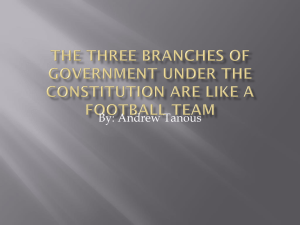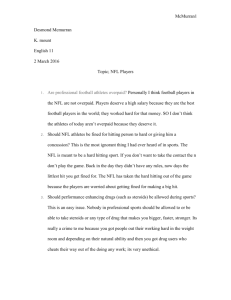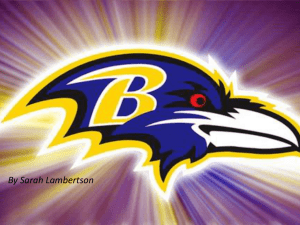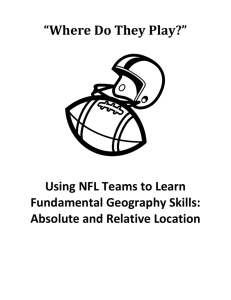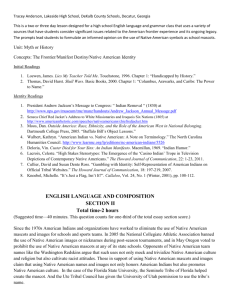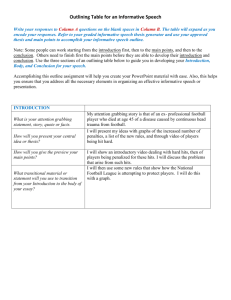Document
advertisement
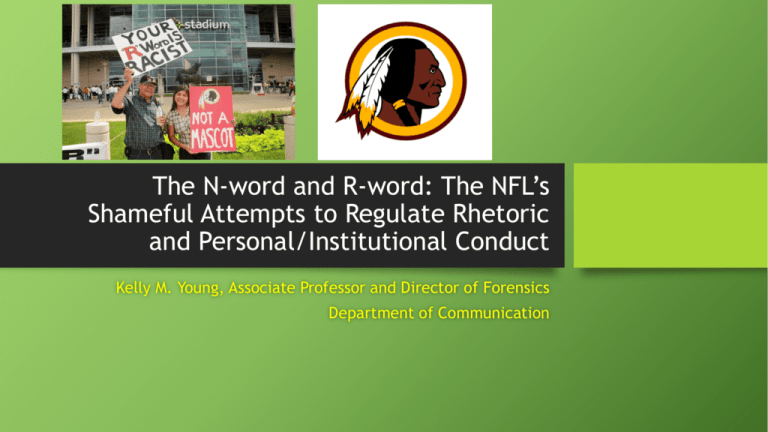
The N-word and R-word: The NFL’s Shameful Attempts to Regulate Rhetoric and Personal/Institutional Conduct Kelly M. Young, Associate Professor and Director of Forensics Department of Communication My interest 2013/2014 as a key moment • Fritz Pollard Alliance calls on NFL to ban the use of the “N” word on the playing field. • 2014 Ferguson, MO protests in response to the shooting death of Brown • Congress calls on Washington owner to change the mascot and logo and the U.S. Patent and Trademark Office cancels the team’s trademark registration because the name is “disparaging.” Mixed, Contradictory, and Shameful Response Why care? • “Native American mascots are a pervasive, ubiquitous feature of American culture” (C. Richard King & Charles Springwood, 2001, 2). • “American Indian mascots are not an Indian issue, they matter to all of us, for only in coming to terms with mascots can we begin to come to terms with the legacies of colonization and start to unravel the racism that dehumanizes and divides all of us” (C. Richard King, 2014, 139-140) Effects of Mascots • Jason Edward Black (2002): mascotting is a “hegemonic strategy of separating American Indians from their cultural heritage. Once this severance occurs, nationalism retains control over what Native American means, how it shall exist, and where is shall relocate through the rhetoric of the mascot” (609) • Mascots dehumanizes. Black (2002): “naming and misrepresentation of Indigenous identity comes to define and, on an ontological level, inhabit what it means to be Native” (610). Effects of Mascots • Robert Jensen (1994): mascots are American fantasies about First Nation people that do not reflect reality . • C. Richard King & Charles Springwood (2001): Mascots are an issue of power – “the conquest of Native America simultaneously empowered Euro-Americans to appropriate, invent, and otherwise represent Native Americans and to long for aspects of their cultures that had been destroyed by conquest” (3) My argument • The intransigent attitude displayed by the NFL and Washington ownership about the R-word is the result of a rhetorical framing that over-emphasizes: • Individual rather than institutional acts of racism • Individual utterances directed at present players rather than systemic uses of discourse to frame an entire population as socially invisible or ontologically dead. Texts • Fritz Pollard Alliance letter to all former, current, and future NFL players, written by John Wooten and Harry Carson on November 21, 2013. • NFL Competition Committee Annual Press Conference on March 26, 2014 to discuss potential changes to NFL rules regarding the use of racial slurs on the field. • Washington owner Dan Snyder’s Letter to Fans printed in the Washington Post on October 9, 2013. • NFL Commissioner Roger Goodell’s June 5, 2013 letter to Congressman Tom Cole and Congresswoman Betty McCollum, Co-Chairs of the Congressional Native American Caucus in the U.S. House of Representatives. Method –Kenneth Burke and Framing • Frame analysis – used by media effects scholars • Burke – Language as a “Terministic Screen” • Selection and Deflection of reality Method –Naming as a Colonial Frame • Naming as a Screen: • “Names order our world and direct our attention” (Mary Stuckey & John Murphy, 2001, p. 74) • “[T]he paradoxical constitutive power at the core of the colonial enterprise: the power to name” (Stuckey & Murphy, 2001, p. 74) • Paradoxical because as we attempt to reflect the world with our names, we also inevitably deflect part of it. As Stuckey & Murphy suggest, “Our names cannot quite define our situations” (2001, p. 74). Dramatism as Discursive Frames • Metaphor of Drama defines human communication • Tragedy • Inflates importance of people, acts, and events to the point of absolutes (e.g., heroes/villains, sacrifice/victimage) • Often leads to violence and limits reflection and critical understanding of important public matters. • Comedy • Corrective to tragedy • Humility, reflective, optimistic • Solve division and hierarchy through identification Method – Burke’s Pentad • ACT • AGENCY • SCENE • PURPOSE • AGENT Analysis The terms defined • Agent - players, fans, officials • Act – unsportsmanlike conduct • Agency – racist language • Scene – the playing field & legacy of fans and key coaches/players • Purpose – Preserve the legacy of the NFL Featured Term - Agent • Agent controls the other dramatic terms within the four texts: • The Scene is entirely about individual’s presence on the field and individual fans • The Act – unsportsmanlike conduct – is entirely about individual player’s acts and not institutional actions (e.g., Washington’s use of their logo/mascot) • Agency – racist language – only matters when directed at individuals present on the field • Purpose – legacy of the NFL – is regulated and controlled by individuals regulating other individuals. Institutional behavior is ignored. Examples • Jeff Fisher – NFL Competition Committee: “…we agreed that we have an issue on the field. We agreed that we are going to get it under control as soon as we possibly can….We are going to clean the game up on the field between the players” Examples • Wooten & Carson (Fritz Pollard Alliance): “As former players…who have worked hard in different eras of the game to leave proud legacies for those who follow us, we are appalled and extremely disappointed to learn that the worst and most derogatory word ever spoken in our country is being used during games as well as casually in the locker room” Examples • Wooten & Carson: “…we cannot condone on any level the use of the ‘N’ word. We understand the history of the game and especially the significance of the reintegration of the [NFL] in 1946 when many who opposed blacks playing in the league used the same racial epithets from the stands. Men like Kenny Washington, Woody Strode, Bill Willis, and Marion Motley bravely withstood the indignity of the ‘N’ word during times when black men were beaten and even hung….To use it now is a disgrace” Examples • Wooten & Carson: “We are simply asking that you respect the dignity of your teammates, fellow players, officials, coaches, fans, and yourselves.” Examples • Dan Snyder: “Like so many of you, I was born a fan of the Washington [team]. I still remember my first…game….That tradition – the song, the cheer – it mattered so much to me as a child, and I know it matters to every other [Washington] fan in the D.C. area and across the nation. Our past isn’t just where we came from – it’s who we are.” Examples • Snyder: “But we cannot ignore our 81 year history, or the strong feelings of most of our fans as well as Native Americans throughout the country. After 81 years, the team name “Redskins” continues to hold the memories and meaning of where we came from, who we are, and who we want to be in the years to come. We are Redskins Nation and we owe it to our fans and coaches and players, past and present, to preserve that heritage.” Examples • Roger Goodell: “In our view, a fair and thorough discussion of the issue must begin with an understanding of the roots of the Washington franchise and the Redskins name in particular….[T]he team began as the Boston Braves in 1932, a name that honored the courage and heritage of Native Americans. The following year, the name was changed to the Redskins – in part to avoid confusion with the Boston baseball team of the same name, but also to honor the team’s then-head coach, William “Lone Star” Dietz. Neither in intent nor use was the name ever meant to denigrate Native Americans or offend any group.” Conclusions Conclusions • Dramatic framing that exaggerates the importance of individuals and their legacy. What its selects or foregrounds: • Focus is on the presence of players on the field and in the community and how they are affected by racist slurs. • Individual utterances directed at players and punishments of individuals • Individual’s experiences and memories tied to a mascot and the exaggerated value of that experience and identity Conclusions • What is Deflected? • Institutional behavior and discourses – not considered a slur because it’s a legacy for individual fans • This dramatic emphasis on the Agent overemphasizes the importance of physical presence on the field (players) or in the stadium (fans), which renders Native American people as socially invisible at best or socially dead at worst. • The colonial appropriation of indigenous values and legacy as the justification or purpose of using racist discourse. Conclusions • What is Deflected? • Contradiction in the understanding of how language operates: • N-word: unredeemable term that causes great harm • R-word: redeemable term that can be appropriated for colonial group identity that is respectful rather than harmful Thank you!
